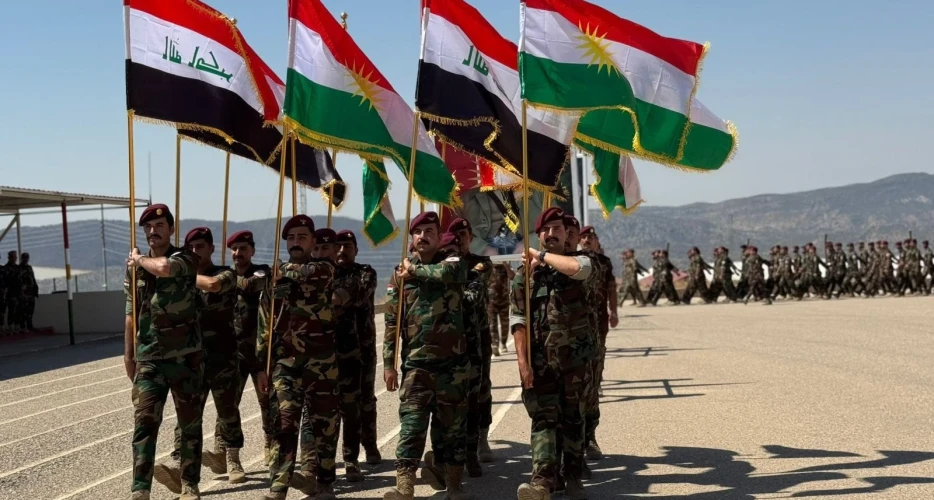
Peregraf
The United States has raised fresh concerns over the slow progress of Peshmerga reform in the Kurdistan Region, citing persistent political obstacles, financial constraints, and stalled efforts to unify the Kurdish military forces under a centralized command, according to a newly released July 2025 report by the U.S. Department of State’s Office of Inspector General.
At the center of the issue lies a 2022 Memorandum of Understanding (MoU) signed between the U.S. and the Kurdistan Regional Government (KRG), which outlined a four-year roadmap to integrate partisan Peshmerga forces—specifically Units 70 (PUK-affiliated) and 80 (KDP-affiliated)—into a single, non-partisan structure under the Ministry of Peshmerga Affairs (MoPA).
However, U.S. officials and Western military advisors say progress has stalled.
"Despite formal commitments, Peshmerga units remain fragmented along party lines, with little meaningful progress toward true unification," the report states.
This fragmentation not only violates the spirit of the reform agreement but also bars thousands of partisan soldiers from receiving coalition stipends, which are contingent on forces being under MoPA command. To date, only approximately 72,000 personnel have begun the transfer process into officially recognized Regional Guard Brigades.
A Longstanding Reform Effort
For eight years, an international coalition led by the United States—alongside Britain, Germany, and the Netherlands—has worked to support the creation of a unified and professional Peshmerga force. This initiative has included the provision of financial support, military supplies, training, and strategic guidance, with the goal of consolidating forces under the umbrella of the Ministry of Peshmerga Affairs.
The foundation of this cooperation was laid with a formal agreement between the U.S. Department of Defense and the Peshmerga in 2016, which was later renewed in September 2020. The agreement aimed to aid the ministry in addressing institutional gaps, enhancing capabilities, and promoting integration between PUK- and KDP-affiliated units.
Political Rivalries Undermine Reform
The Inspector General’s report and experts from institutions such as the Middle East Institute point to long-standing political rivalry between the Kurdistan Democratic Party (KDP) and the Patriotic Union of Kurdistan (PUK) as the core obstacle. Both parties continue to finance and control their respective forces, resisting the full transfer of power to the MoPA.
This party-based military structure is also blamed for fostering corruption, including the widespread issue of "ghost soldiers"—individuals listed on payrolls who never report for duty.
Without dismantling these entrenched partisan loyalties, observers warn that the reform process risks failure.
"It’s not enough to focus solely on the Peshmerga. Broader reform of Kurdistan’s internal security forces and their party control is essential for long-term stability," the report emphasizes.
Financial Constraints Limit Implementation
While the U.S. and its coalition partners continue to offer financial support and training, these benefits are strictly limited to non-partisan units approved by the MoPA. This conditionality has left many forces unfunded, undermining morale and hampering reform momentum.
Complicating the situation further are ongoing budget disputes between Baghdad and Erbil, which have delayed salaries and disrupted operational funding for Peshmerga forces. Although this issue lies beyond the scope of the Inspector General’s report, it exacerbates the broader challenges facing the reform initiative.
U.S.–KRG Agreement Faces Strain
The U.S.–KRG MoU commits both sides to specific steps:
- Transferring party-aligned brigades into unified Regional Guard Brigades,
- Linking financial support strictly to non-partisan service,
- And establishing centralized command structures under MoPA control.
But U.S. frustration is mounting, with advisors warning that future support could be at risk if Kurdish leaders fail to meet their commitments.
A summary of the situation is as follows:
| Theme | U.S. Criticism | Reform Status |
|---|---|---|
| Peshmerga Unification | Delayed; KDP/PUK units still separate | Partial transfers; major gaps remain |
| Political Influence | Corruption, nepotism, party control | MoPA lacks enforcement capacity |
| Budget and Stipends | Only non-partisan units eligible for funding | Support selective and inconsistent |
| U.S.–KRG MoU Implementation | Formal agreement under strain | Behind schedule; risks mounting |
Looking Ahead
For more than eight years, Kurdish leaders—with international support—have sought to unify and professionalize the Peshmerga as a neutral, national force serving all of Kurdistan. While the U.S. continues to offer training, funding, and strategic backing, its patience is wearing thin.
Observers say the success of this reform initiative is critical—not only for regional security but also for preserving international confidence and support.
The Kurdistan Region now stands at a crossroads. Moving forward with genuine unification of its military forces may prove essential to ensuring lasting peace, professional governance, and a stronger position in negotiations with both Baghdad and international allies.